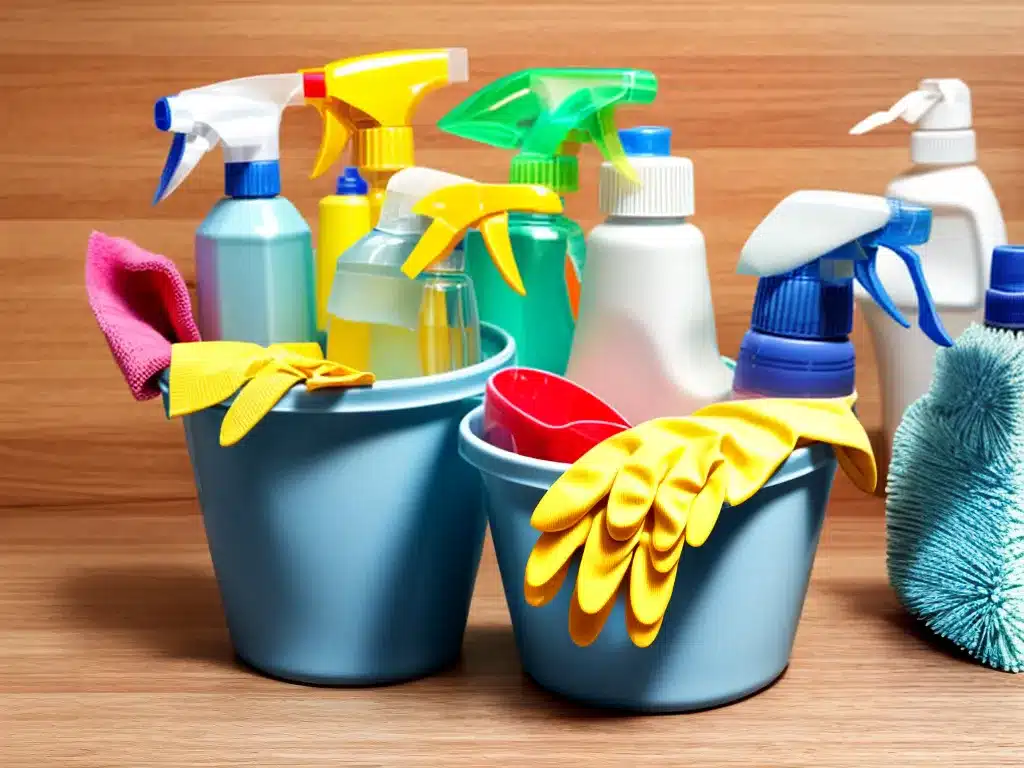Cleaning your home doesn’t have to require fancy products or a lot of money. With a little creativity, you can use common household items to get your home sparkling clean. Here are some of the best cleaning hacks using stuff you probably already have around the house.
Using Vinegar for Cleaning
Vinegar is one of the most versatile cleaning products. The acidic nature of vinegar helps dissolve dirt, grease, soap scum, and mineral deposits. Vinegar is also antibacterial, making it great for disinfecting surfaces. Here are some ways to use vinegar for cleaning:
Cleaning Floors
Mix 1 cup vinegar with 1 gallon water and use to mop tile, vinyl, and sealed hardwood floors. The vinegar helps cut through grease and grime, leaving floors shiny. For extra cleaning power, add a few drops of essential oil like lemon or eucalyptus.
Disinfecting Counters
Wipe down kitchen and bathroom counters with undiluted vinegar to kill bacteria. The vinegar smell will fade as it dries. For heavily soiled counters, let the vinegar sit for several minutes before scrubbing and rinsing.
Descaling Faucets
Remove mineral deposits from faucets by soaking paper towels or a washcloth in vinegar and wrapping around the faucet. Let sit for an hour before scrubbing away buildup.
Unclogging Drains
Pour 1/2 cup baking soda down the drain followed by 1 cup vinegar. Let fizz for 10-15 minutes then rinse with hot water. The chemical reaction helps break up sludge and grease clogs.
Baking Soda as a Cleaner
Like vinegar, baking soda has many cleaning uses. It works as a gentle abrasive and is also a natural deodorizer. Ways to use baking soda for cleaning include:
Scouring Sinks and Tubs
Make a paste with 3 parts baking soda to 1 part water. Scrub onto surfaces with a sponge or brush to remove stains in enamel or stainless steel sinks and tubs. Rinse thoroughly after scrubbing.
Deodorizing Carpets
Sprinkle baking soda liberally on carpets and let sit for up to an hour before vacuuming to freshen and remove odors. The baking soda absorbs unpleasant smells rather than masking them.
Polishing Chrome
Mix baking soda with warm water to make a paste. Rub onto faucets, shower heads, and other chrome fixtures with a soft cloth. Rinse thoroughly and buff dry for a shine.
Cleaning Greasy Pans
Coat greasy pans with a layer of baking soda and add water to make a paste. Let sit for 15 minutes before scrubbing and rinsing. The baking soda emulsifies grease so it rinses cleanly.
Using Hydrogen Peroxide for Disinfecting
Hydrogen peroxide is another inexpensive but effective household cleaner. At 3-5% concentration, hydrogen peroxide is a natural disinfectant and bleaching agent. Some uses for hydrogen peroxide include:
Disinfecting Sponges and Rags
Soak used sponges and dish rags in a 50/50 mixture of hydrogen peroxide and water to kill bacteria and remove stains.
Whitening Bathtubs
Wipe down bathtubs with undiluted hydrogen peroxide to remove soap scum and stains. Let sit for 10 minutes before rinsing clean.
Brightening Whites
Add 1 cup hydrogen peroxide to your regular cycle of whites for a brighter wash. It helps lift stains and whiten clothing.
Sanitizing Counters
Mix equal parts hydrogen peroxide and water in a spray bottle. Mist kitchen and bathroom counters then let sit for several minutes before wiping clean. Kills germs naturally.
Lemon Juice as a Degreaser
Citrusy lemon juice cuts through grease and freshens as it cleans. Some smart ways to use lemon for cleaning include:
Cleaning Microwaves
Fill a microwave-safe bowl with 1 cup water and the juice of 1 lemon. Microwave for 5 minutes allowing the steam to condense on the walls. Wipe away grease easily with a cloth.
Deodorizing Garbage Disposals
Pour lemon juice down the disposal and let sit for 5 minutes before running cold water to rinse. This freshens the drain and helps break down grease.
Polishing Wood Furniture
Combine lemon juice with olive oil for a natural wood polish. Add a few drops of lemon essential oil if you want a fresh lemon scent. Buff wood with a soft cloth.
Cutting Through Soap Scum
Use straight lemon juice to wipe away soap scum on shower doors, bathtubs, and bathroom sinks. Rinse thoroughly after letting the juice sit for a few minutes.
Castile Soap for An All-Purpose Cleaner
Castile soap is vegetable-based and biodegradable, making it an eco-friendly cleaning option. Many homemade cleaning sprays include castile soap as a key ingredient. Here are some ways to use it:
Hard Surface Cleaner
Mix 1/2 tsp liquid castile soap, 1 Tbsp vinegar, and 2 cups water. Spray on counters, stainless steel, glass, mirrors, finished wood, and tile. Wipe with a microfiber cloth.
Produce Wash
Add a few drops of castile soap and 1 Tbsp lemon juice to a bowl of water. Soak fresh fruits and vegetables before rinsing. Gets rid of dirt and residues.
Window Cleaner
Combine 2 cups water, 1/4 cup vinegar, and 1-2 tsp castile soap in a spray bottle. Shake gently and spray windows, then wipe clean with newspaper or a lint-free cloth.
Natural Hand Soap
Thin castile soap with water to desired consistency and add several drops of essential oil for scent if desired. Dispenses just like traditional hand soap.
With a little creativity, you can take inexpensive items like vinegar, baking soda, hydrogen peroxide, lemons, and castile soap and use them to make your own powerful cleaners. Give these homemade solutions a try the next time you need to give your home a good scrub down.







